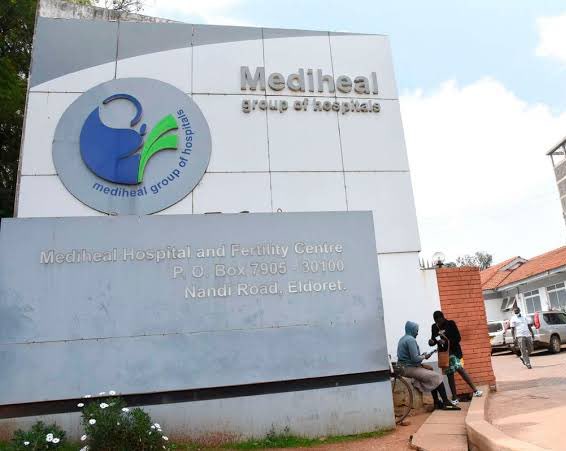NAIROBI, Kenya — In a saga that reads more like a medical thriller than real life, one of Kenya’s most prominent private hospitals, Mediheal Group of Hospitals, is now at the center of an unfolding controversy over alleged human organ trafficking.
But rather than retreat into silence, the hospital is stepping forward — loudly — insisting it has nothing to hide.
“We are clean, our services are clean,” declared Mediheal’s legal team during a press briefing, firmly denying allegations of malpractice at its Fertility and Transplant Centre in Eldoret. “We’re inviting the government to audit us. The patients are ready to testify.”
Breaking News:DCI Transnational Organized Crime Unit takes over investigation case where Mediheal Hospital is implicated in the trafficking of human organs harvested at its Fertility and Transplant Centre in Eldoret, Uasin Gishu county.
DCI Steps In: Transplant Tourism and Ethical Red Flags
The turning point? A recent exposé that cast a harsh spotlight on alleged unethical practices, including transplant tourism and the commercialization of donated organs.
The Directorate of Criminal Investigations (DCI) wasted no time, launching a full-scale probe led by Director Mohamed Amin.
DCI’s elite Transnational Organized Crime Unit (TOCU) has now taken charge, consolidating past reports, recording fresh witness accounts, and conducting forensic investigations to trace the truth.
The public has been encouraged to share any credible information directly with the DCI at their headquarters in Nairobi.
In the meantime, the Ministry of Health has suspended all transplant operations at Mediheal’s Eldoret branch for 90 days as investigations unfold.
Lawmakers Demand Answers: Is Kenya’s Organ Transplant System Broken?
The scandal has also caught the attention of Parliament. The National Assembly’s Health Committee, chaired by Seme MP Dr. James Nyikal, is running its own inquiry into the larger state of organ transplants in Kenya.
“This is a matter that strikes at the core of human dignity and medical ethics,” said Nyikal. “Were the procedures at Mediheal aligned with the Health Act and the Human Tissue Act? Were donors misled, coerced, or even paid? We intend to find out.”
Already, the Kenya Renal Association has raised concerns over potential coercion and improper consent procedures, suggesting that vulnerable donors may have been exploited — possibly in exchange for financial incentives. That, experts say, would be a clear violation of both local laws and international transplant ethics.
Mediheal Responds: “Let’s Set the Record Straight”
Despite the mounting pressure, Mediheal’s legal team maintains that the accusations are unfounded and insists on full transparency. With over a decade in the transplant space, Mediheal says it welcomes scrutiny — and believes a public audit will vindicate the institution.
“All records are available. All procedures were documented. If there’s any doubt, we want it cleared — publicly and professionally,” their lawyers stated.
But as the dust continues to swirl around Kenya’s transplant industry, the bigger question remains: Is this an isolated incident or a symptom of systemic cracks in the country’s healthcare oversight.
In an era where technology, ethics, and health are more entwined than ever, this investigation into Mediheal’s transplant practices feels both timely and essential.
As government agencies and lawmakers dig into the truth, what’s at stake isn’t just Mediheal’s reputation — it’s public trust in Kenya’s entire medical system.




